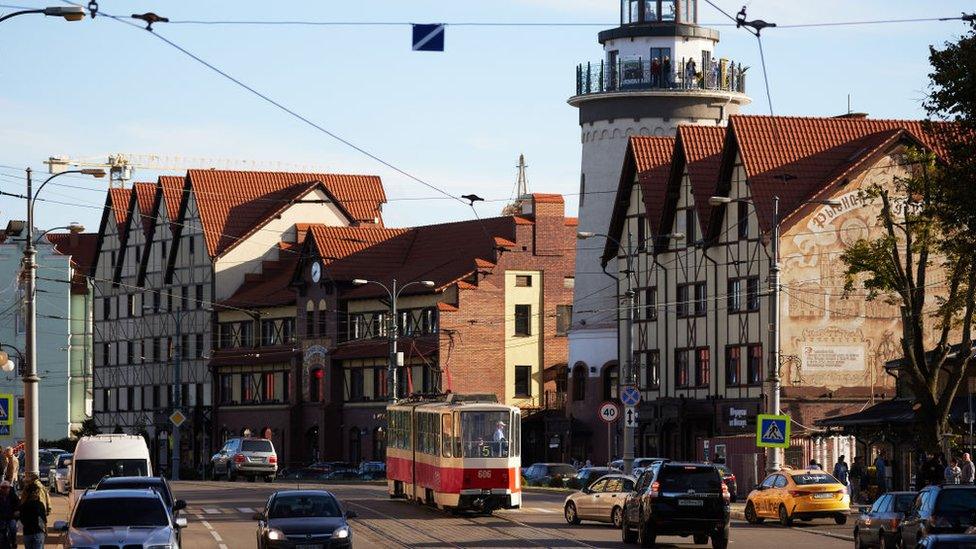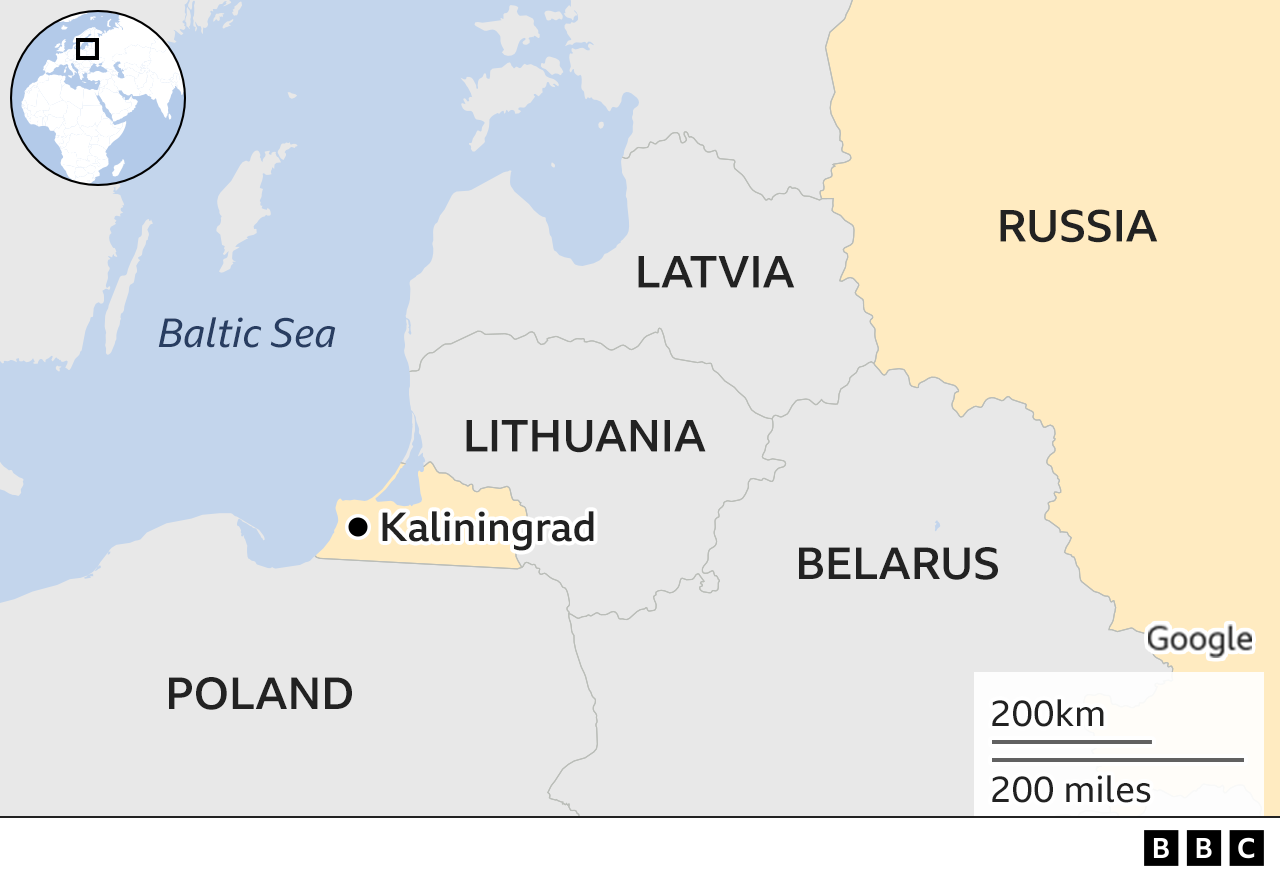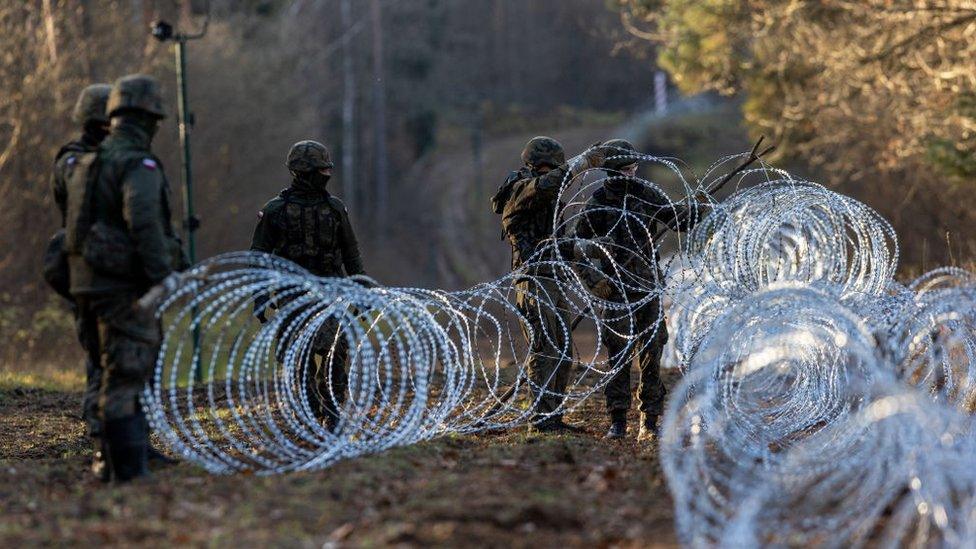Kaliningrad: Russia fury as Poland body recommends renaming exclave
- Published

Kaliningrad is home to one of Russia's only ice-free European ports - the other is on its Arctic coast
The Kremlin has reacted furiously after a Polish government body advised using a different name for Russia's exclave of Kaliningrad on the Baltic Sea coast.
The Polish committee said the city and wider area should instead be called Królewiec.
This was the area's traditional name, it said, and the decision no longer to use an "imposed name" was partly a result of Russia invading Ukraine.
Russia said the decision was "bordering on madness" and "a hostile act".
"We know that throughout history, Poland has slipped from time to time into this madness of hatred towards Russians," said Kremlin spokesman Dmitry Peskov.
For hundreds of years before World War Two, the area was known as Königsberg and was part of East Prussia. Królewiec is the Polish translation of Königsberg.
However, after World War Two, the city and wider region were placed under Soviet administration. The Soviets renamed it Kaliningrad after Mikhail Kalinin, one of the leaders of the Bolshevik revolution.
After the Soviet Union collapsed, Kaliningrad became part of the territory of Russia, making it an exclave - an area that is geographically separated from a country's main territory - located between Poland and Lithuania.
Kaliningrad is strategically important to Moscow because it houses the Russian Baltic Fleet at the port of Baltiysk and is one of Russia's only ice-free European ports.

On Tuesday, Poland's Committee on Standardisation of Geographical Names Outside the Republic of Poland said it was recommending with immediate effect that the city be known in Poland as Królewiec and the exclave's wider area as Obwód Królewiecki.
It said the name Kaliningrad was unrelated to either the city or the region and had an "emotional and negative" resonance in Poland.
Mikhail Kalinin was one of six Soviet Politburo signatories to the order to execute more than 21,000 Polish prisoners of war in the forests of Katyn and elsewhere in 1940.
Russia's invasion of Ukraine and its propaganda efforts had prompted Poland to re-evaluate controversial "imposed names", the committee added.
"Each country has the right to use in its language traditional names constituting its cultural heritage, but it cannot be forced to use names unacceptable by it in its language," the committee said.
Moscow initially blamed the Nazis for the Katyn Massacre when the Germans discovered the mass graves in 1943.
Because Moscow imposed a communist regime on Poland after World War Two, the relatives of the victims were unable to publicly discuss or find anything out about the crime for five decades. Russia only acknowledged its responsibility for the massacre in 1990.
Although the state committee's recommendation is not binding, it is expected that Polish state bodies will now refer to Kaliningrad as Królewiec. Poland's foreign ministry has issued a positive assessment of the name change.

Poland is putting up razor wire at its border with the exclave
Poland has also begun to fortify its border with the exclave following Russia's invasion of Ukraine.
The Polish military has erected a temporary 2.5m-high razor wire fence and last month began work to install cameras and motion sensors along the 232-km border. Anti-tank obstacles have also been positioned at border crossings.
Polish officials are concerned that Russia could use that border as a new migrant route into the EU, following reports of increased direct flights from the Middle East and elsewhere to Kaliningrad.
Poland has erected a 5.5m-high steel fence along part of its border with Belarus after an increase in migrants crossing into Poland, Lithuania and Latvia from there.